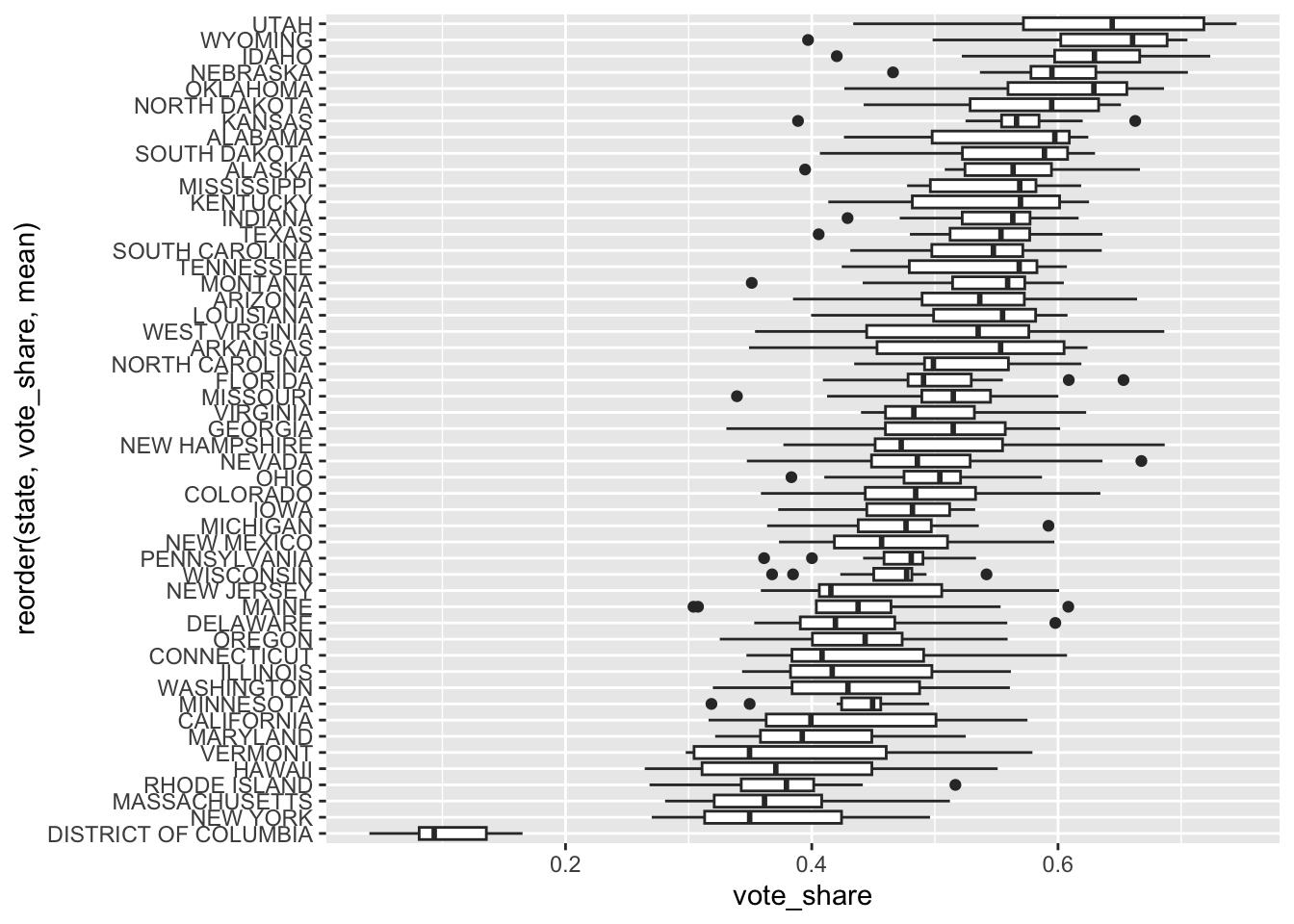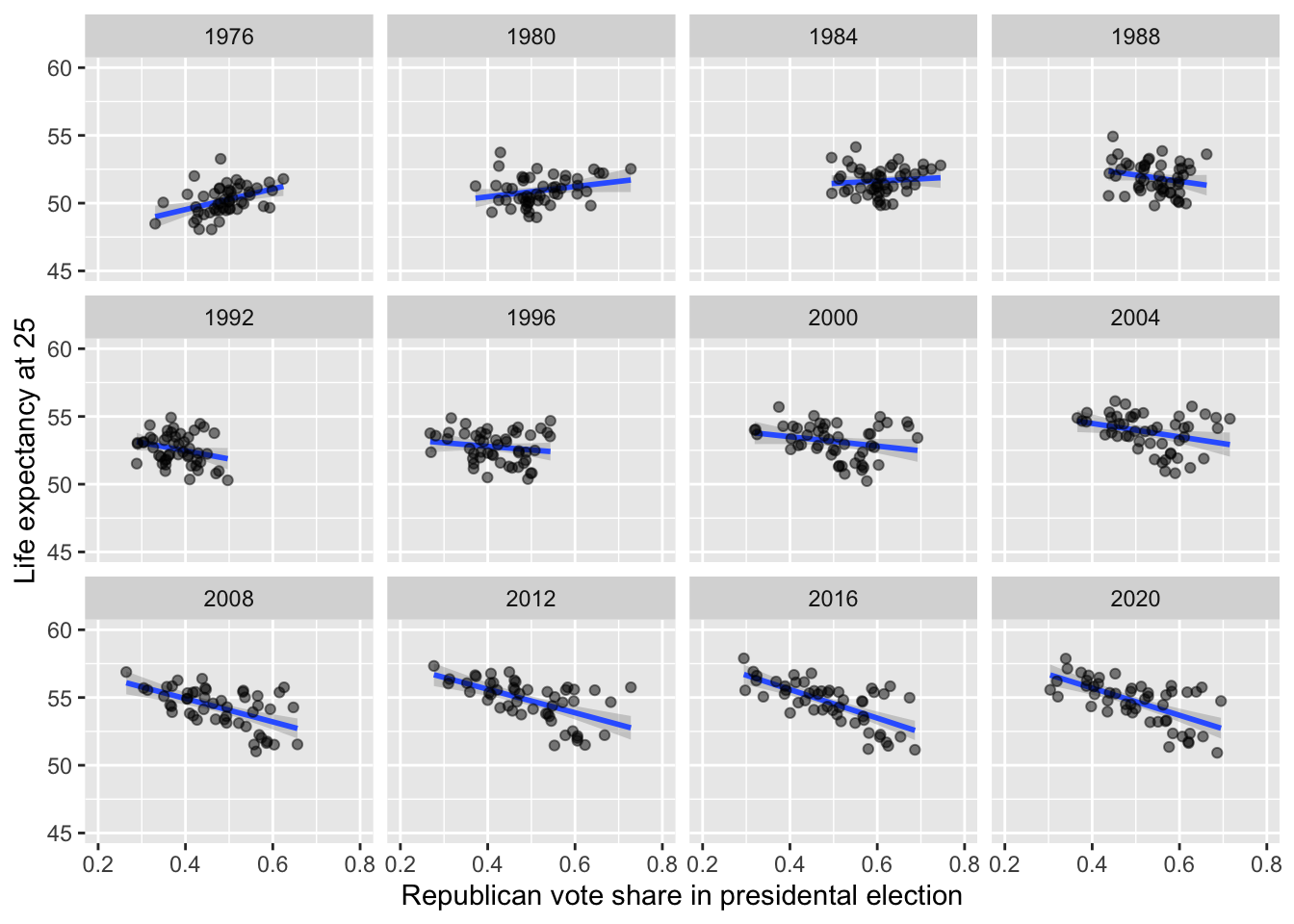repository <- "data"Preparation: US Republican vote shares and life expectancy
For Session 8
The main goal of this (relatively easy) exercise is to replicate a small part of a recent paper by Anne Case and Angus Deaton. The paper is accessible at the following address:
https://www.nber.org/papers/w29241
The paper was later published in the following journal:
Anne Case and Angus Deaton, “The Great Divide: Education, Despair, and Death,” Annual Review of Economics, vol 14(1), 2022.
Read enough of it to understand the argument behind Figure 2, and to understand the data sources.
Scenario
You are a reviewer for the Annual Review of Economics, and are interested in replicating the authors’ figures in order to check whether they contain any errors.
Instructions
This dataset is an extract from the U.S. Mortality Database (HMD). The variables are:
state_po— U.S. state (postal code)year— year of measurementlexp25— life expectancy at 25
As in Case and Deaton’s paper, the 2020 estimate for life expectancy in that dataset is the (most recent) 2018 estimate. Read more on the HMD on its website if needed.
It corresponds to the life expectancy data used by Case and Deaton, with the exacted variables required to replicate Figure 2 of their paper:

# life expectancy
le <- readr::read_csv(paste0(repository, "/1976-2020-life-expectancy-at-25.csv"))Rows: 612 Columns: 3
── Column specification ────────────────────────────────────────────────────────
Delimiter: ","
chr (1): state_po
dbl (2): year, lexp25
ℹ Use `spec()` to retrieve the full column specification for this data.
ℹ Specify the column types or set `show_col_types = FALSE` to quiet this message.head(le)# A tibble: 6 × 3
state_po year lexp25
<chr> <dbl> <dbl>
1 AK 1976 49.8
2 AK 1980 49.8
3 AK 1984 51.4
4 AK 1988 51.9
5 AK 1992 52.4
6 AK 1996 52.5If you want, you can find yourself which dataset you need to download from the MIT Election Lab to replicate Figure 2.
Questions
library(tidyverse) # {dplyr}, {ggplot2}, {readxl}, {stringr}, {tidyr}, etc.le %>%
group_by(year) %>%
summarise(n = n(),
mu_lexp = mean(lexp25),
sd_lexp = sd(lexp25)
)# A tibble: 12 × 4
year n mu_lexp sd_lexp
<dbl> <int> <dbl> <dbl>
1 1976 51 50.1 1.19
2 1980 51 50.8 1.21
3 1984 51 51.6 1.16
4 1988 51 51.7 1.44
5 1992 51 52.5 1.43
6 1996 51 52.6 1.41
7 2000 51 53.1 1.39
8 2004 51 53.8 1.42
9 2008 51 54.2 1.49
10 2012 51 54.8 1.51
11 2016 51 54.6 1.59
12 2020 51 54.7 1.61?dplyr::filter.
# presidential returns (Republican vote shares)
pr <- readr::read_csv(paste0(repository, "/1976-2020-president.csv")) Rows: 4287 Columns: 15
── Column specification ────────────────────────────────────────────────────────
Delimiter: ","
chr (6): state, state_po, office, candidate, party_detailed, party_simplified
dbl (7): year, state_fips, state_cen, state_ic, candidatevotes, totalvotes, ...
lgl (2): writein, notes
ℹ Use `spec()` to retrieve the full column specification for this data.
ℹ Specify the column types or set `show_col_types = FALSE` to quiet this message.head(pr)# A tibble: 6 × 15
year state state_po state_fips state_cen state_ic office candidate
<dbl> <chr> <chr> <dbl> <dbl> <dbl> <chr> <chr>
1 1976 ALABAMA AL 1 63 41 US PRESIDENT "CARTER, JI…
2 1976 ALABAMA AL 1 63 41 US PRESIDENT "FORD, GERA…
3 1976 ALABAMA AL 1 63 41 US PRESIDENT "MADDOX, LE…
4 1976 ALABAMA AL 1 63 41 US PRESIDENT "BUBAR, BEN…
5 1976 ALABAMA AL 1 63 41 US PRESIDENT "HALL, GUS"
6 1976 ALABAMA AL 1 63 41 US PRESIDENT "MACBRIDE, …
# ℹ 7 more variables: party_detailed <chr>, writein <lgl>,
# candidatevotes <dbl>, totalvotes <dbl>, version <dbl>, notes <lgl>,
# party_simplified <chr>pr <- pr %>%
filter(party_simplified %in% "REPUBLICAN" & writein==FALSE)
head(pr)# A tibble: 6 × 15
year state state_po state_fips state_cen state_ic office candidate
<dbl> <chr> <chr> <dbl> <dbl> <dbl> <chr> <chr>
1 1976 ALABAMA AL 1 63 41 US PRESIDENT FORD, GE…
2 1976 ALASKA AK 2 94 81 US PRESIDENT FORD, GE…
3 1976 ARIZONA AZ 4 86 61 US PRESIDENT FORD, GE…
4 1976 ARKANSAS AR 5 71 42 US PRESIDENT FORD, GE…
5 1976 CALIFORNIA CA 6 93 71 US PRESIDENT FORD, GE…
6 1976 COLORADO CO 8 84 62 US PRESIDENT FORD, GE…
# ℹ 7 more variables: party_detailed <chr>, writein <lgl>,
# candidatevotes <dbl>, totalvotes <dbl>, version <dbl>, notes <lgl>,
# party_simplified <chr>Look the problem we have in the dataset for the candidate Mitt Romney.
pr %>%
filter(stringr::str_detect(candidate, "ROMNEY")) %>%
pull(candidate) %>% table().
MITT, ROMNEY ROMNEY, MITT
1 50 Let’s correct it!
pr <- pr %>%
mutate(candidate = ifelse(stringr::str_detect(candidate, "ROMNEY"),"ROMNEY, MITT",candidate))# compute vote share
pr <- pr %>% mutate(vote_share = candidatevotes / totalvotes)
# or
# pr$vote_share <- pr$candidatevotes / pr$totalvotes
summary(pr$vote_share) Min. 1st Qu. Median Mean 3rd Qu. Max.
0.0407 0.4203 0.4945 0.4898 0.5693 0.7450 # quick inspection of vote shares by year (candidates shown for reference)
pr %>% group_by(year, candidate) %>%
summarise(
n = n(),
min_vs = min(vote_share),
mean_vs = mean(vote_share),
max_vs = max(vote_share)
) %>%
arrange(-mean_vs)`summarise()` has grouped output by 'year'. You can override using the
`.groups` argument.# A tibble: 12 × 6
# Groups: year [12]
year candidate n min_vs mean_vs max_vs
<dbl> <chr> <int> <dbl> <dbl> <dbl>
1 1984 REAGAN, RONALD 51 0.137 0.597 0.745
2 1988 BUSH, GEORGE H.W. 51 0.143 0.537 0.662
3 2004 BUSH, GEORGE W. 51 0.0934 0.522 0.715
4 1980 REAGAN, RONALD 51 0.134 0.513 0.728
5 2020 TRUMP, DONALD J. 50 0.304 0.500 0.695
6 2000 BUSH, GEORGE W. 51 0.0895 0.496 0.692
7 2012 ROMNEY, MITT 51 0.0728 0.489 0.728
8 1976 FORD, GERALD 51 0.165 0.483 0.624
9 2016 TRUMP, DONALD J. 51 0.0407 0.482 0.686
10 2008 MCCAIN, JOHN 51 0.0653 0.469 0.656
11 1996 DOLE, ROBERT 51 0.0934 0.413 0.544
12 1992 BUSH, GEORGE H.W. 51 0.0910 0.376 0.497# same thing, graphical approach
ggplot(pr, aes(vote_share, reorder(interaction(year, candidate), vote_share))) +
geom_boxplot()
# quick inspection of vote shares by state
pr %>% group_by(state) %>%
summarise(
n = n(),
min_vs = min(vote_share),
mean_vs = mean(vote_share),
max_vs = max(vote_share),
sd_vs = sd(vote_share)
) %>%
arrange(-mean_vs)# A tibble: 51 × 6
state n min_vs mean_vs max_vs sd_vs
<chr> <int> <dbl> <dbl> <dbl> <dbl>
1 UTAH 12 0.434 0.626 0.745 0.105
2 WYOMING 12 0.397 0.625 0.705 0.0931
3 IDAHO 12 0.420 0.616 0.724 0.0804
4 NEBRASKA 12 0.466 0.598 0.706 0.0617
5 OKLAHOMA 12 0.426 0.597 0.686 0.0844
6 NORTH DAKOTA 12 0.442 0.576 0.651 0.0719
7 KANSAS 12 0.389 0.562 0.663 0.0655
8 ALABAMA 12 0.426 0.561 0.625 0.0688
9 SOUTH DAKOTA 12 0.407 0.557 0.630 0.0704
10 ALASKA 12 0.395 0.556 0.667 0.0680
# ℹ 41 more rows# same thing, graphical approach
ggplot(pr, aes(vote_share, reorder(state, vote_share, mean))) +
geom_boxplot()
?dplyr::inner_join (or merge)
# merge both datasets by year and state
d <- inner_join(le, pr, by = c("year", "state_po"))# something close to Fig. 2
d %>% filter(!state_po %in% "DC") %>%
ggplot(aes(y = lexp25, x = vote_share)) +
geom_smooth(method = "lm") +
geom_point(alpha = 1/2) +
facet_wrap(~ year) +
# axis limits used in Fig. 2 (those will exclude DC by design)
lims(y = c(45, 60), x = c(.2, .8)) +
# axis titles
labs(
y = "Life expectancy at 25",
x = "Republican vote share in presidental election"
)# correlation, overall
with(d, cor(lexp25, vote_share))[1] -0.1031829# correlation, without DC
with(d %>% filter(!state_po %in% "DC"), cor(lexp25, vote_share))[1] -0.261351Negatively correlated, especially without DC.
# correlation, per year (Case and Deaton p. 22)
d %>% filter(!state_po %in% "DC") %>%
group_by(year) %>%
summarise(n = n(), rho = round(cor(lexp25, vote_share), 2))# A tibble: 12 × 3
year n rho
<dbl> <int> <dbl>
1 1976 50 0.42
2 1980 50 0.26
3 1984 50 0.1
4 1988 50 -0.22
5 1992 50 -0.27
6 1996 50 -0.16
7 2000 50 -0.24
8 2004 50 -0.31
9 2008 50 -0.57
10 2012 50 -0.59
11 2016 50 -0.69
12 2020 50 -0.64But the correlation was positive many decades ago!
The numbers in the paper seem correct!
Source
R code to generate the 1976-2020-life-expectancy-at-25 dataset
The code below is provided for reference. You do not need it to complete the exercise.
library(tidyverse)
fs::dir_ls("ushmd-2021-01-07/", glob = "*.csv") %>%
map_dfr(readr::read_csv, col_types = cols()) %>%
# get LE for both sexes at 25 for presidential election years + 2018
filter(Age %in% "25", Year %in% c(seq(1976, 2020, by = 4), 2018)) %>%
# use 2018 as estimate for LE at 25 in election year 2020
mutate(year = if_else(Year == 2018, 2020, Year)) %>%
# keep only useful columns (ex = exact LE at year x = 25)
select(state_po = PopName, year, lexp25 = ex) %>%
readr::write_csv("1976-2020-life-expectancy-at-25.csv")